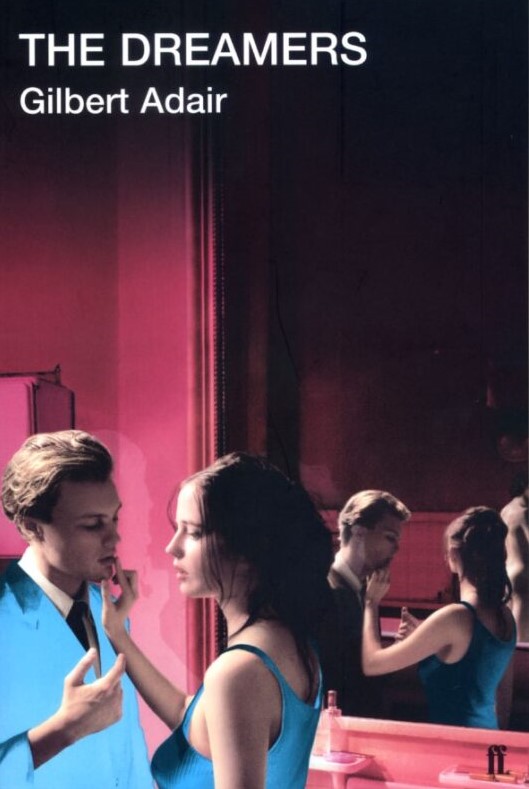
You were the baby of the class you know
You were so young and so uncertain
Suffer little children
Oh what a poor soulErasure
Hey now, hey now
Don’t dream, it’s over.Crowded House
The Litera(p)ture of Ontological Desire
Or should I have written The Holy Innocents (1988) Redux, perhaps? For when Gilbert Adair’s agent was approached by Jeremy Thomas – a British movie producer of such memorable flicks like Oscar-ridden The Last Emperor, totally whacky Naked Lunch, or Merry Christmas, Mr. Lawrence – one of only six movies in which David Bowie starred as a male lead – and acknowledged that Bernardo Bertolucci himself was not only whetting his appetite for the movie adaptation of the novel, but also wished Adair wrote a screenplay, the British author immediately gave in, tempted by the occasion to rewrite and re-entitle or – as he himself put it – “overwrite” The Holy Innocents with which he had grown strangely dissatisfied. That’s pretty much how The Dreamers came to life.
The above lightweight “forewordy” anecdote straight from the cinema world was a bit telltale, as you will see for yourselves in a minute or two. But now, let’s face the slight inconvenience with continuity… Each and every time, a flawless attention to detail is needed to deject the possibility of stirring up the atmosphere of the scene, the vibe of the plot, the general ambience of the Mansion of Litera(p)ture. Ah, yesss… The Baroque House buffed up, unfolded, the premises (here, the double meaning in full bloom) of its geometry based upon smoldering glances of the Silver Screen starlets… We leave its enchanting foreground of Frothy Vestibule and, with our hearts pounding wildly, as if a hummingbird on coke desired to outflutter its ever-eager wings, enter another room. What is it?
The Kitchen-sink (Ir)realism
The common knowledge says most accidents occur at home. Leaving the statistics for more justified and rational circumstances, what room seems to be the most dangerous, then? Garage? Nah. Not everyone likes tinkering with their cars, motorcycles, lawnmowers, etc. until the wee hours of the morning. Besides, not everybody even has one. Bathroom? Sounds pretty tempting. Mop the floor and you’ll end up having splendidly unassuming, leg-breaking, concussion-inducing trap (yellow Slippery When Wet signs are good for public places and names for Bon Jovi LP’s). Blow dry your hair while having a bath and chances are you’ll turn into a piece of toast. But still, my best bet is kitchen. You hang out in there a lot, not only during dinner time, but also casually, without any particular reason, popping in for a sandwich, for a sip of milk, for a few grapes from a fruit tray, and so on. It is a store for various potentially harmful utensils (knives, cleavers, graters, potato peelers, can openers, meat forks and tenderizers, ice picks [Sharon, calm down and keep your legs crossed!], pizza cutters, rolling pins, seafood shears, etc.), appliances (pressure cookers, meat and coffee grinders, blenders, microwaves, deep fryers) as well as hazardous elements of the interior “landscape” (scalding hot oil, boiling water, preheated ovens, baking pans with apple pies inside them, cooling down on windowsills). A dangerous place, indeed. Just like desire could be…
The Dreamers takes place in Paris in a turbulent spring of 1968. Ahhh, the late 60’s – the last epoch of human naivety, its last caprice of innocence. The innocence of a belief that the status quo of existential habits and the rules of the game called Civilization are correctable, ready to alter on a whim. That the new ensuing set of meta-practices and post-values implemented in place of the old ones – trashed and heaped up mercilessly at the junkyard of obsolete customs and overwrought thoughts – would suffice. That the Jungian collective unconsciousness will not fall victim to the brute, boorish, myopic impotence of the revolution. That the unus mundus – one world – hypothesis and other “uncharted territories” of reality are going to stand still or lie dormant while that highfalutin hullabaloo hurls around and wreaks havoc in the name of not that well thought out progress, without any consequences. That the revolutionaries themselves are courageous and prodigious enough not to become cowardly prodigal sons of unforeseen twists of fate, and persistent enough not to get pranked by the good old chaos. For it takes infinite strength of will to bear in mind (let alone handling it in reality!) the raving intricacies of contingency, the embodiment of haphazard turn of events lying ahead as a consequence of each and every conceivable, radical deed. One false move – hell, one right move, too! – and all goes down the drain, to which the instigators, perpetrators, agent provocateurs would react with boohoohoo faces of a brainwashed clockwork Alex. But all of the above is rather an irrelevant, second-rate dimension, like a texture of the tiles on the kitchen floor. The real desire of The Dreamers lies somewhere else – among the trio of protagonists. What happens between them is the ontological constituent of the Mansion’s Kitchen.
Isabelle, Théo and Matthew. The first two are 17-year-old nonidentical twins, a progeny of an exceptionally rare breed of artist – a materialistically successful poet. The third one – a student from San Diego, one year older than the siblings, rather namby-pamby, definitely bashful and psychologically timorous – is of a bourgeoisie or, in terms of the wild wild West, middle class origin. All three of them are movie buffs of the kind which not only flabbergast people with their extensive knowledge of cinema, but also ignite fierce pangs of jealousy among other movie maniacs (all right, all right, I admit I inferred that conclusion from my own envy – I consider myself “movie buff light”…). The amateur gang of celluloid fetishists frequent the most famous of all film archives in the world – Cinémathèque Française – where other cinephiles roam as wild horses did back in the day. After the spontaneous reenactment of one of the most memorable scenes from Jean-Luc Godard’s movie Band of Outsiders – speed-visiting Louvre – our fidgety trio, under unexpectedly favorable conditions (the poet dad and subservient mom need to take refuge in their summer house outside Paris, for he has to put finishing touches to his latest work, undisturbed by the clinking clanking collection of caliginous distractions the capital of France provides bountifully), obfuscate itself to form a half-incestuous ménage à trois.
The Dark Decor of Desire
Deleuze writes:
Now we can return to perception. All monads express the whole world darkly, even if not in the same order. Each one encloses in itself the infinity of minute perceptions. They cannot be distinguished by weakness or strength. What distinguishes them is their zone of clear, remarkable, or privileged expression. Ultimately, “totally naked monads” (lacking this zone of light) might be conceived. They would live in darkness or near-darkness, in the vertigo and giddiness of minute and dark perceptions. No differential mechanism of reciprocal determination would come to select a few of these tiny perceptions in order to extract a clear perception. They would have nothing remarkable about them.
How kind and thoughtful of Gilles – helping me out like that! For our very naughty trio descends into or, rather, strips itself down exactly to the dimension of “minute and dark perceptions”. The teenagers “(de)monadize” themselves by virtue of fancy game Isabelle names Home Movies. The rules are pretty simple: each of the profligate participants reenacts – without fixed turns, while going about their daily routine – a movie scene spurred by tiny associations, petite recollections, negligible gestures they once observed on the silver screen and, out of the blue, recalled. If a challenged player, handpicked by the “actor” to guess the movie the reenacted scene comes from, fails to do so, he or she forfeits. It is precisely the nature of said forfeits that illustrates another trait of the Kitchen, ever more randy, lewd and debauched with every game of Home Movies going on – the metamorphosis into a Home Cinema with a bar in the back.
For nobody has claimed The Mansion of Litera(p)ture is insusceptible to shape shifting. Just as our Vestibule (via Vian’s Froth on the Daydream) revolved around enchantment and the silver screen smoldering glances (what a premonition, by the way!), as an underlying metaphysical rule on how should we try to imagine the geometry of the Mansion, here, in the Kitchen/Home Cinema, the rules are different. The sensations, “minute and dark perceptions”, now taken not as a monadic seeming-in-the-world, “trembling” of “concentration, accumulation, coincidence of a certain number of converging preindividual singularities”, but as metaphysical, nonhuman “bricks” with which our Mansion has been constructed, begin to oscillate, attract each other, dance and breed yet another wants and cravings for new rules to push the (r?)evolution of the Mansion further.
The Baroque solution is the following: we shall multiply principles – we can always slip a new one out from under our cuffs – and in this way we will change their use. We will not have to ask what available object corresponds to a given luminous principle, but what hidden principle responds to whatever object is given, that is to say, to this or that “perplexing case.” Principles as such will be put to a reflective use. A case being given, we shall invent its principle. It is a transformation from Law to universal Jurisprudence.
The letters which seduce with their nauseating nocuous nocturnes of wet dreams. The sentences like femmes fatales, irresistibly tempting, yet tempestuous and pesky – the unhinged sources of unending temptation and trepidation. Paragraphs resembling whores in skimpy thongs giving throbbing throngs of incessant excitement, leaving you senseless or “senseful”, depending on whether you gave or received. Chapters, a double-crossing, conniving chaperones, Marquises de Merteuils of intrigues, cold-hearted malevolent succubi of emotional scumbaggery, donned in an elaborate and eloquent elegance of linguistic exuberance. Look! The lights have just dimmed down! The séance is about to begin. What is it going to be? A movie Travis Bickle took Betsy to watch on their date? Whose hand is going to land on your knee and slowly creep upwards in a spidery, sliding manner, in a vein the Engineer chased Kristy in The Hellraiser?…
Cooling off a bit, no wonder Isabelle, Théo and Matthew – our ever less innocent, or shall we simply say “nocent”, cherubs of bawdy, lascivious activities – were bound to fall for the metamorphosis of the Mansion’s Kitchen. They now serve a double purpose as multipliers of new rules – the bawdy brood of “minute and dark perceptions” – as well as – on the other hand, eliding their monadic qualities, quantities and convergent singularities – metaphysical “architects”, who erect the rapturous, luscious edifice of Home Cinema. Unfortunately, this spectacular feat occurs WITHIN the enclosed reality of Isabelle and Théo’s parents roomy apartment. The minute our exmonadic rule makers and raunchy terraformers step outside their finite alternative world, they clash with more spacious, more capricious and more unforgiving revolutionary reality. They are willing to comply, they try to conform (Oh, Sweetest Irony! Why are you not my one and only love!?). Alas, in the end, with their jaws (r/de?)evolved into mere mechanical valves of pleasure, they bite more than they could chew. With their (In)nocence lost, the dream is over…
Yet, our séance continues. The Mansion hollers ontological piquancy and purrs literary terms of endearment, with a sultry murmur. They nestle into our earlobes. There are corridors to stride, other rooms to explore. We get up from the chaise lounge of the in-house Silver Screen. We come over to the bar in the back and pour ourselves a shot of whiskey, to gather up. Where would the exit of Home Cinema lead us to? Just you wait and see…
Amonne Purity



